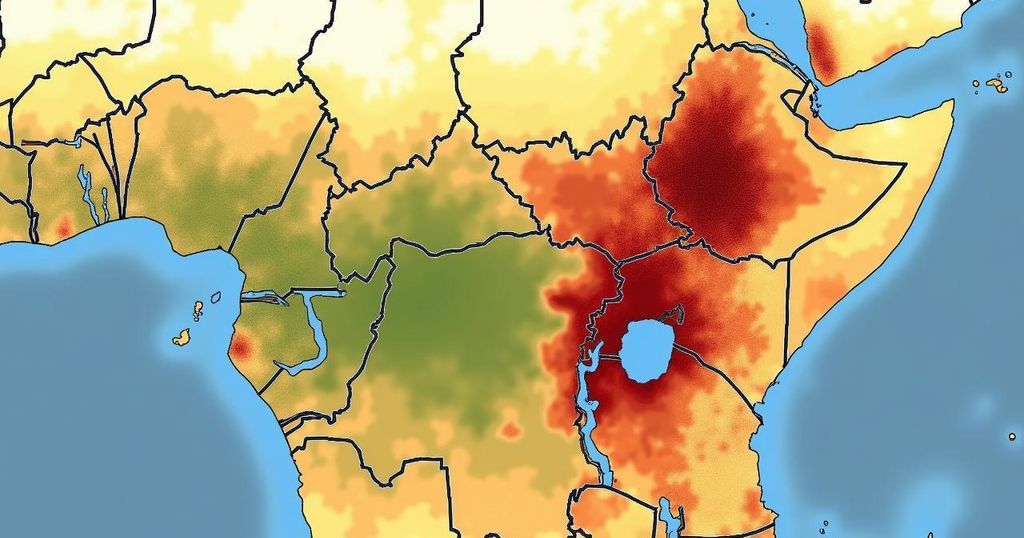The 2023/2024 El Niño event has precipitated severe drought across Southern Africa, leading to catastrophic food insecurity affecting approximately 23 million people. Six countries have declared national drought disasters, with millions in Angola and Mozambique experiencing food shortages. The drought amplifies existing health crises, including cholera outbreaks, and poses risks such as increased HIV transmission and mental health issues. Immediate humanitarian assistance is essential to address these intertwined challenges.
The southern African region is grappling with one of the most severe droughts in four decades, primarily attributed to the ongoing 2023/2024 El Niño phenomenon. This climatic event has manifested as a delayed onset of rains, prolonged dry spells during the growing season, and extreme temperatures. The ramifications of these conditions are dire, particularly for communities that were already vulnerable due to previous agricultural failures and challenging economic circumstances. According to estimates from national governments and the Famine Early Warning Systems Network (FEWS NET), the impact of this historic drought has resulted in significantly diminished maize harvests across the affected countries, leading to alarming food insecurity levels. Currently, approximately 23 million individuals face acute food shortages, with the most impacted nations being Malawi, Zambia, Zimbabwe, and Mozambique. Furthermore, between 14.0 and 14.9 million people are projected to require urgent humanitarian assistance during the critical lean season from October to December 2024. The situation has escalated to a national disaster level in six countries: Botswana, Lesotho, Malawi, Namibia, Zambia, and Zimbabwe. Additionally, Angola and Mozambique are notable for their distress, with roughly 1.8 million and 3.3 million people, respectively, experiencing food insecurity. The adverse effects of the drought extend beyond mere food shortages; they have led to significant displacement, increased disease outbreaks, particularly cholera and measles, and an emerging threat from mpox, which could hinder effective response efforts. Compounding these challenges, the region is currently confronting one of its most severe cholera epidemics in decades. Despite some stabilization in the situation, persistent water shortages are undermining essential hygiene and sanitation initiatives, thus perpetuating the risk of further choleral outbreaks, especially in nations like Malawi and Mozambique. Moreover, the challenges resulting from the drought could amplify the risks associated with HIV and AIDS transmission, exacerbate mental health concerns, and increase instances of gender-based violence. These multifaceted crises necessitate an urgent call for enhanced preparedness and response mechanisms to counter the intertwined effects of climate change, cholera outbreaks, and ongoing regional conflicts on public health systems. In this context, it is imperative to recognize that over one million people have been internally displaced as a direct consequence of climate-related disasters, with the majority originating from Malawi, Mozambique, and Zimbabwe.
The 2023/2024 El Niño event has profoundly influenced the climate conditions in Southern Africa, causing rain delays, extended dry periods, and soaring temperatures. These factors have contributed significantly to widespread drought scenarios, which are detrimental to agricultural production and food security. Historically, Southern Africa has struggled with recurrent droughts, but the current El Niño event is noted as the most severe in the last 40 years, exacerbating existing vulnerabilities within already marginalized communities and impacting public health.
In summary, the drought conditions promulgated by the 2023/2024 El Niño event have resulted in unparalleled food insecurity and public health challenges across Southern Africa. With millions facing acute food shortages and serious health threats from disease outbreaks, the situation necessitates immediate and coordinated humanitarian efforts. To effectively address these issues, it is crucial for local and international actors to enhance preparedness and response strategies, particularly in health service access and resource allocation amid worsening climatic effects.
Original Source: reliefweb.int






